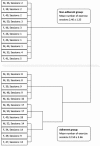HIV Patient Characteristics that Affect Adherence to Exercise Programmes: An Observational Study
- PMID: 20871752
- PMCID: PMC2944991
- DOI: 10.2174/1874613601004010148
HIV Patient Characteristics that Affect Adherence to Exercise Programmes: An Observational Study
Abstract
Background: Benefits of exercise for HIV-infected persons have been documented, although in clinical practice, diminished adherence to exercise limits the effectiveness of this auxiliary treatment. Exercise intervention studies carry the caveat that the results are limited to volunteers with good compliance and completion profiles.
Objectives: This study aimed to identify characteristics contributing to adherence vs non-adherence to prescribed supervised 10-week 75-minute aerobic and progressive resistance exercise programme in a clinical setting that requires twice-weekly attendance at the physiotherapy gym.
Study design: This observational study was comprised of 11 males and 11 females, physician-assessed, HIV seropositive patients referred to exercise programmes in a tertiary multi-disciplinary outpatient service for HIV patients at an urban Teaching Hospital in London (UK). Measurements taken prior to the exercise programme were used as dependent variables and include CD4 count, fitness level, flexibility and perceived physical-, emotional-, functional- and psychological- well-being. Attendance records were categorised into a dichotomous independent variable of adherence based on a natural break that occurred at 8/20 attended sessions.
Results: Prior-to-treatment differences in perceived physical, functional and psychological well-being exist between adherent and non-adherent patients, but no differences were found in age, CD4 count or fitness level. Perceived well-being explained 55.7% of the variances in attendance. Gender and reason for referral appear to be independent of adherence, whereas ethnicity may play an influential role.
Conclusion: Perceived well-being appears to differentiate between adherent and non-adherent patients. Further studies are required to investigate other psychological characteristics and barriers to maintaining exercise.
Keywords: HIV patient; adherence.; exercise programme.
Figures


Similar articles
-
Understanding how adherence goals promote adherence behaviours: a repeated measure observational study with HIV seropositive patients.BMC Public Health. 2012 Aug 1;12:587. doi: 10.1186/1471-2458-12-587. BMC Public Health. 2012. PMID: 22853824 Free PMC article. Clinical Trial.
-
Erratum.Mult Scler. 2016 Oct;22(12):NP9-NP11. doi: 10.1177/1352458515585718. Epub 2015 Jun 3. Mult Scler. 2016. PMID: 26041800
-
The change in motivating factors influencing commencement, adherence and retention to a supervised resistance training programme in previously sedentary post-menopausal women: a prospective cohort study.BMC Public Health. 2015 Mar 12;15:236. doi: 10.1186/s12889-015-1543-6. BMC Public Health. 2015. PMID: 25884764 Free PMC article.
-
The development of an evidence-based physical self-management rehabilitation programme for cancer survivors.Patient Educ Couns. 2008 May;71(2):169-90. doi: 10.1016/j.pec.2007.11.027. Epub 2008 Feb 5. Patient Educ Couns. 2008. PMID: 18255249 Review.
-
Factors influencing the exercise behaviour of patients.Sports Med. 1985 Sep-Oct;2(5):348-66. doi: 10.2165/00007256-198502050-00004. Sports Med. 1985. PMID: 3901174 Review.
Cited by
-
Management of Reduced Bone Mineral Density in HIV: Pharmacological Challenges and the Role of Exercise.Front Physiol. 2018 Aug 7;9:1074. doi: 10.3389/fphys.2018.01074. eCollection 2018. Front Physiol. 2018. PMID: 30131721 Free PMC article. Review.
-
Social-Ecological, Motivational and Volitional Factors for Initiating and Maintaining Physical Activity in the Context of HIV.Open AIDS J. 2015 Oct 20;9:96-103. doi: 10.2174/1874613601509010096. eCollection 2015. Open AIDS J. 2015. PMID: 26587078 Free PMC article.
-
Advancing research and practice in HIV and rehabilitation: a framework of research priorities in HIV, disability and rehabilitation.BMC Infect Dis. 2014 Dec 31;14:724. doi: 10.1186/s12879-014-0724-8. BMC Infect Dis. 2014. PMID: 25551619 Free PMC article.
-
A systematic review of effects of concurrent strength and endurance training on the health-related quality of life and cardiopulmonary status in patients with HIV/AIDS.Biomed Res Int. 2013;2013:319524. doi: 10.1155/2013/319524. Epub 2013 Apr 3. Biomed Res Int. 2013. PMID: 23691497 Free PMC article.
-
Examining the impact of a community-based exercise intervention on cardiorespiratory fitness, cardiovascular health, strength, flexibility and physical activity among adults living with HIV: A three-phased intervention study.PLoS One. 2021 Sep 24;16(9):e0257639. doi: 10.1371/journal.pone.0257639. eCollection 2021. PLoS One. 2021. PMID: 34559851 Free PMC article. Clinical Trial.
References
-
- Ammassari A, Trotta MP, Murri R, et al. AdICoNA Study Group. Correlates and predictors of adherence to highly active antiretroviral therapy: overview of published literature. J AIDS. 2002;3(S):123–7. - PubMed
-
- Reynolds NR. Adherence to antiretroviral therapies: state of the science. Curr HIV Res. 2004;2:207–14. - PubMed
-
- Sherr L, Lampe F, Norwood S, et al. Adherence to antiretroviral treatment in patients with HIV in the UK: a study of complexity. AIDS Care. 2008;20:442–8. - PubMed
-
- Fogarty L, Roter D, Larson S, Burke J, Gillespie J, Levy R. Patient adherence to HIV medication regimens. A review of published and abstract reports. Patient Educ Counsel. 2002;46:93–108. - PubMed
-
- Stirrat MJ, Gordon CM. HIV treatment adherence research and intervention: current advances and future challenges. J HIV AIDS Soc Serv. 2007;1/2:9–22.
LinkOut - more resources
Full Text Sources
Research Materials
